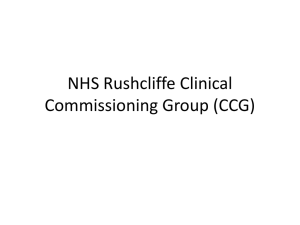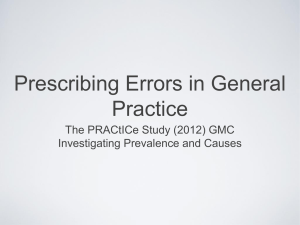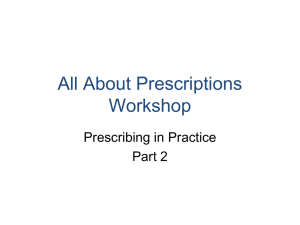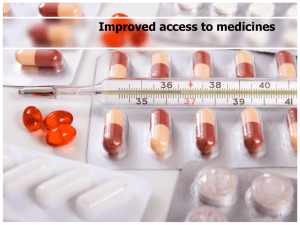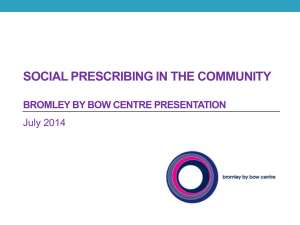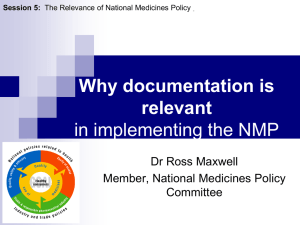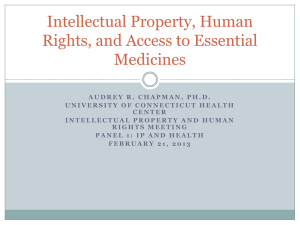Regulations for the prescribing of Schedule 8
advertisement
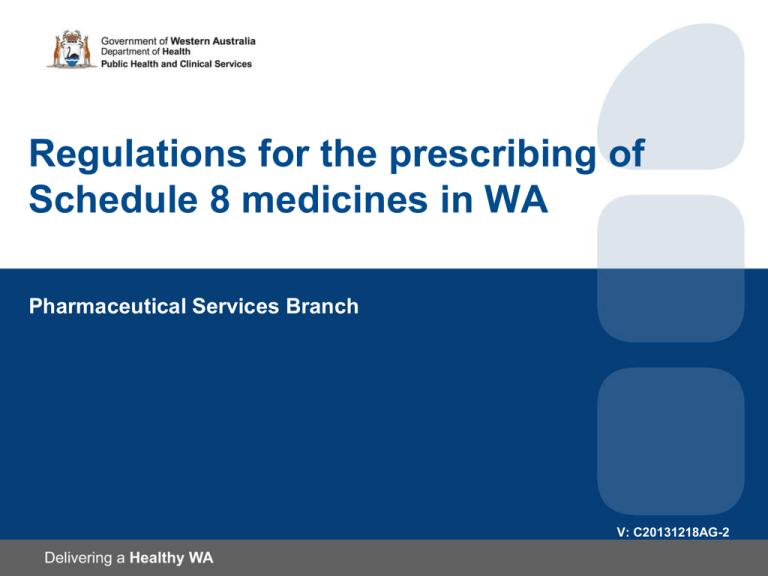
Regulations for the prescribing of Schedule 8 medicines in WA Pharmaceutical Services Branch V: C20131218AG-2 Aims of presentation To focus Schedule 8 (S8) medication regulations for prescribers on: prescribing storage disposal recording and monitoring. 2 Regulations Definition of a Schedule 8 medicine: ‘Substances which may be available for use but require restriction of manufacture, supply, distribution, possession and use to reduce abuse, misuse and physical and psychological dependence.’ 3 Regulations – Schedule 8 medicines Generic name Form Brand names Alprazolam Tablets (IR) Kalma Xanax Alprax Ralozam Buprenorphine Patch (SR) Sublingual tablet (IR) Tablet (IR) * Norspan Temgesic Subutex Codeine Tablet (IR) Liquid (IR) Codeine phosphate Actacode Fentanyl Flunitrazepam Hydromorphone Patch (IR) Tablet (IR) Liquid (IR) Tablet (MR) Durogesic Hypnodorm Dilaudid Jurnista Ketamine Lozenges (oral) Intramuscular (IR) Ketamine Ketalar Methadone Tablet (IR) Suppositories Liquid (IR) * Physeptone Proladone Methadone 4 Regulations – Schedule 8 medicines Generic name Form Brand names Morphine Tablet (IR) Epidural injection (MR) Tablet (CR) Tablet (SR) Tablet (CR) Tablet (CR) Liquid (IR) Tablet (IR) Anamorph Depo-Dur Kapanol Momex MS Contin MS Mono Ordine Sevredol Oxycodone Tablet (IR) Tablet (MR) Capsule (IR) Liquid (IR) Endone OxyContin OxyNorm OxyNorm elixir Oxycodone/naloxone Tablets (PR) Targin Pethidine Injection (IR) Pethidine Note: (1) This table is only a sample of S8 medicines available at the time compiled. For a compete set of generic S8 medicines included in Schedule 8 of the Poisons Act 1964 refer to the current edition of the Standard for the Uniform Scheduling of Medicines and Poisons (SUSMP). (2) Not included are buprenorphine or methadone, prescribed as part of the CPOP program, and stimulant medicines (Refer to Stimulant Prescribing Code). 5 Who authorises what? State Pharmaceutical Services Branch (PSB): legal requirements for the prescriber authorises a doctor to prescribe S8 medicines for long term (>60 days) use or for registered drug addicts specific dose for a set time period conditions are applied to authorisations when required written authorisations are issued (verbal authorisations are not permitted). Commonwealth Pharmaceutical Benefits Service (PBS): payment or subsidy of prescriptions for patients ‘authority required’ for increased quantities and repeats to be subsidised increased quantity of the PBS item: refer to the schedule of benefits authorisation can be obtained over the phone hospital discharge: Those hospitals under the PBS reform can provide a one month supply on a PBS prescription. refer to the schedule to confirm quantity allowed obtain authorisation as above if quantity greater than allowed. 6 Regulations – Schedule 8 prescribing A valid S8 prescription must include: full name and address of prescriber date prescription written full name, address and DOB of patient description and quantity of medicine to be prescribed precise directions for use number of repeats (if any) and intervals at which they may be dispensed signature of the prescriber. Bold points above must be written in the prescriber’s own handwriting (includes on computer generated S8 prescriptions). 7 Regulations – Schedule 8 prescribing Only one S8 medicine (and no other medicine) can be written per prescription page. A second S8 may be included if it is the same drug in a different form i.e. oxycodone SR and IR. If an unusual dose is prescribed this must be underlined and initialled to confirm it is the intended dose. If a verbal order is made the prescriber must send a written prescription within 24 hours to the pharmacy to whom the instructions were given. Prescriptions should not be given to the patient to deliver to the pharmacy. 8 Regulations – Schedule 8 prescribing S8 prescriptions are valid for six months. Authorisation from the CEO of Health is required for: patients notified as addicts prescription period longer than 60 days in any 12 month period flunitrazepam prescribing. HDWA number is to be endorsed by the prescriber on every prescription for flunitrazepam. The purpose of authorisation is to: support doctors in the appropriate use of S8 medicines minimise drug dependence reduce abuse and diversion. 9 Regulations – Schedule 8 prescribing Self prescribing of S8 medicines is illegal. Prescribing S8 medications for immediate family is strongly discouraged. If a medical practitioner has concerns about a new or existing patient they are encouraged to check the prescription history of the patient: PSB on 9222 4424 available 8.30am to 4.30pm M – F Medicare Australia Medicines Information Line for information on doctor shoppers on 1800 631 181. 10 Regulations – Schedule 8 prescribing Medical or nurse practitioners may be contacted by pharmacists to verify the authenticity of the prescription before dispensing. S8 prescriptions written in other states which are valid and complies with WA poison regulations can be dispensed in WA. In some states S8 prescriptions can only be dispensed if written by a prescriber practising in that state. 11 Regulations – Schedule 8 prescribing Advise patients: The repeats of prescriptions dispensed in WA are required to be retained at the pharmacy, who dispensed the original prescription, for repeat dispensing. Should they relocate, an application can be made to the pharmacists to transfer the prescription to another pharmacy. 12 Regulations – S8 Authorisations Send a completed Application for authorisation to prescribe a Schedule 8 medicine form to the PSB Department of Health WA. Forms are available from www.health.wa.gov.au/S8 Contacting PSB WA on (08) 9222 4424 Consultant support in the form of a written report will be required for high risk patients as defined in the Schedule 8 Medicines Prescribing Code. 13 Schedule 8 Medicines Prescribing Code Implemented 1 January 2013 Why a prescribing code? risk based approach to S8 regulation assist practitioners in meeting legislative requirements contribute towards best practice S8 prescribing. 14 15 When is Schedule 8 prescribing outside the Code? *off-label use of S8 medicines unregistered S8 medicines stimulants prescribed as part of the Stimulant Regulatory Scheme methadone or buprenorphine prescribed as part of the Community Program for Opioid Pharmacotherapy (CPOP). Note: *off-label use means use for an indication not approved on the Australian Register of Therapeutic Goods (ARTG). 16 Revocation of Schedule 8 prescribing rights Withdrawal of rights to prescribe S8 medicines: repeated failure to adhere to the requirements for authorisation disregard for the requirements to prescribe within the authorised dose breach of the Poisons Act and Regulations. When the CEO of Health revokes S8 prescribing rights, the matter is reported to Australian Health Practitioners Regulatory Agency (AHPRA). 17 Schedule 8 medicines in Surgeries Medical centres Individual doctors Poisons permit required? Yes No Can medicines be ‘pooled’ for use by all doctors? Yes No Doctor’s bag storage N/A Must stay in medical practitioner’s possession at all times, cannot be left in the surgery overnight unless in a safe. Storage of S8 medicines when the surgery is closed In a safe – Guidance Note Purchasing a Safe In a safe – Guidance Note Purchasing a Safe Register for recording transactions (including doses administered to patients) HA14 Register Schedule 8 drugs record book of administration (or HA14 Register) Records must be kept for: seven years seven years Labelling Label required if supplied to patient for use outside surgery. Must include date of supply, patient name, directions for use, name of surgery. Warning label about drowsiness and use of alcohol also mandatory. Label required if supplied to patient for use outside surgery. Must include date of supply, patient name, directions for use, name of surgery. Warning label about drowsiness and use of alcohol also mandatory. Overall responsibility for S8 ordering, storage and record keeping. Permit holder (may be medical practitioner or registered nurse) Individual medical practitioner 18 Regulations – Disposal of Schedule 8 medicines Regulations restrict who can authorise the destruction of S8 medicines. A reason for the destruction (e.g. stock expired) must be recorded. Destruction of S8 medicines requires two authorised people to sign the Register, such as: a medical practitioner and a pharmacist or two pharmacists. For further information refer to the PBS website – see HA14 Register training guide 19 Resources Pharmaceutical Services Branch: www.health.wa.gov.au/S8 Royal Australasian College of Physicians: www.racp.edu.au/page/policy-and-advocacy/publichealth-and-social-policy Drug and Alcohol Office: www.dao.health.wa.gov.au/Informationandresources/p ublicationsandresources/healthprofessionals.aspx 20 Pharmaceutical Services Branch contacts Telephone: (08) 9222 4424 Fax: (08) 9222 2463 Email: poisons@health.wa.gov.au Post: The Pharmaceutical Services Branch PO Box 8172 Perth Business Centre WA 6849 21 Other contacts Medicare Australia Medicines Information Line 1800 631 181 Next Step (08) 9219 1919 Alcohol and Drug Information Services (ADIS) (08) 9442 5000 or 1800 198 024 22
